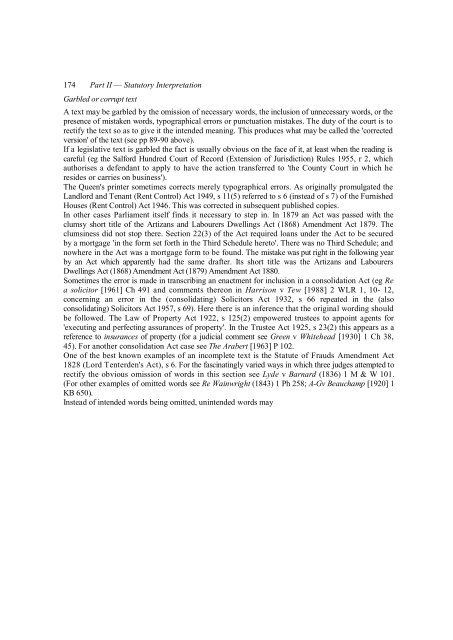Statutory Interpretation The Technique of Statutory ... - Francis Bennion
Statutory Interpretation The Technique of Statutory ... - Francis Bennion
Statutory Interpretation The Technique of Statutory ... - Francis Bennion
Create successful ePaper yourself
Turn your PDF publications into a flip-book with our unique Google optimized e-Paper software.
174 Part II — <strong>Statutory</strong> <strong>Interpretation</strong><br />
Garbled or corrupt text<br />
A text may be garbled by the omission <strong>of</strong> necessary words, the inclusion <strong>of</strong> unnecessary words, or the<br />
presence <strong>of</strong> mistaken words, typographical errors or punctuation mistakes. <strong>The</strong> duty <strong>of</strong> the court is to<br />
rectify the text so as to give it the intended meaning. This produces what may be called the 'corrected<br />
version' <strong>of</strong> the text (see pp 89-90 above).<br />
If a legislative text is garbled the fact is usually obvious on the face <strong>of</strong> it, at least when the reading is<br />
careful (eg the Salford Hundred Court <strong>of</strong> Record (Extension <strong>of</strong> Jurisdiction) Rules 1955, r 2, which<br />
authorises a defendant to apply to have the action transferred to 'the County Court in which he<br />
resides or carries on business').<br />
<strong>The</strong> Queen's printer sometimes corrects merely typographical errors. As originally promulgated the<br />
Landlord and Tenant (Rent Control) Act 1949, s 11(5) referred to s 6 (instead <strong>of</strong> s 7) <strong>of</strong> the Furnished<br />
Houses (Rent Control) Act 1946. This was corrected in subsequent published copies.<br />
In other cases Parliament itself finds it necessary to step in. In 1879 an Act was passed with the<br />
clumsy short title <strong>of</strong> the Artizans and Labourers Dwellings Act (1868) Amendment Act 1879. <strong>The</strong><br />
clumsiness did not stop there. Section 22(3) <strong>of</strong> the Act required loans under the Act to be secured<br />
by a mortgage 'in the form set forth in the Third Schedule hereto'. <strong>The</strong>re was no Third Schedule; and<br />
nowhere in the Act was a mortgage form to be found. <strong>The</strong> mistake was put right in the following year<br />
by an Act which apparently had the same drafter. Its short title was the Artizans and Labourers<br />
Dwellings Act (1868) Amendment Act (1879) Amendment Act 1880.<br />
Sometimes the error is made in transcribing an enactment for inclusion in a consolidation Act (eg Re<br />
a solicitor [1961] Ch 491 and comments thereon in Harrison v Tew [1988] 2 WLR 1, 10- 12,<br />
concerning an error in the (consolidating) Solicitors Act 1932, s 66 repeated in the (also<br />
consolidating) Solicitors Act 1957, s 69). Here there is an inference that the original wording should<br />
be followed. <strong>The</strong> Law <strong>of</strong> Property Act 1922, s 125(2) empowered trustees to appoint agents for<br />
'executing and perfecting assurances <strong>of</strong> property'. In the Trustee Act 1925, s 23(2) this appears as a<br />
reference to insurances <strong>of</strong> property (for a judicial comment see Green v Whitehead [1930] 1 Ch 38,<br />
45). For another consolidation Act case see <strong>The</strong> Arabert [1963] P 102.<br />
One <strong>of</strong> the best known examples <strong>of</strong> an incomplete text is the Statute <strong>of</strong> Frauds Amendment Act<br />
1828 (Lord Tenterden's Act), s 6. For the fascinatingly varied ways in which three judges attempted to<br />
rectify the obvious omission <strong>of</strong> words in this section see Lyde v Barnard (1836) 1 M & W 101.<br />
(For other examples <strong>of</strong> omitted words see Re Wainwright (1843) 1 Ph 258; A-Gv Beauchamp [1920] 1<br />
KB 650).<br />
Instead <strong>of</strong> intended words being omitted, unintended words may

















